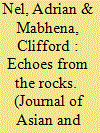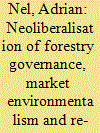| Srl | Item |
| 1 |
ID:
178384


|
|
|
|
|
| Summary/Abstract |
This article seeks to characterise and contextualise land reform, and the experiences of resettled farmers, in the under-researched Matabeleland South. It does so through a historicised, landscape approach to changes in the post-Fast Track Land Reform Programme agrarian structure in two wards in Matobo District. While new land dispensation is still consolidating, outcomes are varied, and while beneficiaries are vulnerable to drought in mixed farming there is also notable resilience. Importantly, we argue that changes in the landscape ‘echo’ the past, where material and discursive changes play out at the same time as agrarian livelihoods evolve.
|
|
|
|
|
|
|
|
|
|
|
|
|
|
|
|
| 2 |
ID:
142660


|
|
|
|
|
| Summary/Abstract |
There is often a disjuncture between idealised forestry governance models which posit a ‘win-win for community and environment’ through participatory, multi-stakeholder international development discourses and interventions – and the actually existing processes and structures of natural resource government through which they are articulated. By applying, first, established theorisations of the initial territorialisation of state forestry territory, then conceptualisations of re- and de-territorialisation, derived from Deleuzo-Guattarian formulations, this paper expands on post-structuralist lines of inquiry on the political ecology of forestry to explore substantive transformations in forestry governance in Uganda. It specifically details the role that market environmentalism – the extension of market mechanisms, including carbon forestry, to natural resource governance – plays in reorienting assemblages of actors engaged in forestry governance and in changing configurations of state forestry territory.
|
|
|
|
|
|
|
|
|
|
|
|
|
|
|
|